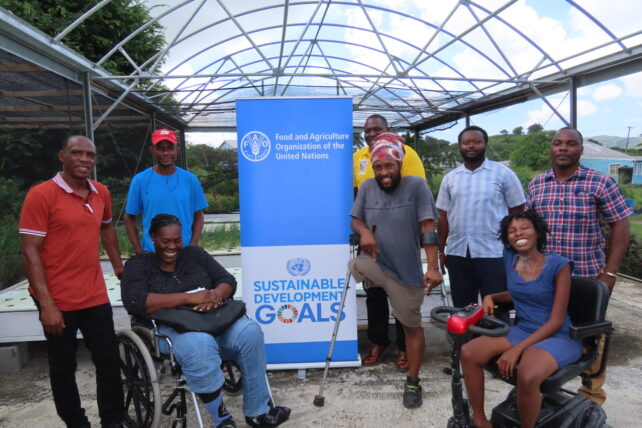
21 November 2022 – Bridgetown, Barbados – The Food and Agriculture Organization of the United Nations (FAO) in partnership with the local Ministries of Agriculture, recently rolled out the second phase of the Innovative Protected Cultivation Systems Project in Barbados, St. Kitts and Nevis, Antigua and Barbuda and Grenada from 31 October to 05 November 2022, led by FAO’s Vegetable Production Specialist, Jervis Rowe.
In this phase of the project, 21 farms across the Caribbean were selected by FAO and the Ministries of Agriculture which received technical guidance on managing production in protected cultivation systems based on local conditions. Some of the topics covered included introduction to greenhouse production systems, climate management and its influence in yields, covering materials, production systems including substrates, fertigation systems, water management, sanitation, exclusion measures, tutoring systems, seedling production, record keeping, plant nutrition and management for specific crops.
Equally important under the project were the field visits with extension officers to beneficiary farms aimed at building the capacity of the officers in managing these systems as well as developing strong relations and trust among stakeholders who will be involved optimizing their current systems. Among the beneficiary farmers were members of the Antigua and Barbuda Association for Persons Living with Disabilities.
The adjustments of the structures will be made to make the benches suitable for persons with disabilities using hydroponic systems. The beneficiary farms were also used as demonstration plots during the training.
In addition to the technical training provided by FAO, the protective structures of the existing beneficiary farms will also be upgraded by the organization and the farmers. Jervis Rowe explained that the project will improve and upgrade materials and retrofit the structures to make them more conducive to growing in these harsh tropical condition. He added, “Apart from the anti-thermal plastic, FAO will also be supplying the farmers with proper shade netting which helps to clad the structure in a way that will support more positive ventilation in the structure”.
Meanwhile, Vermaran Extavour, International Expert – Value Chain and Project Coordination stated the project also aimed to maximize the local production of vegetables, while using the opportunity to build out the business cases for farmers for what they can produce and at what costs inside the protective two structures, namely hydroponics and soil-based mediums. She added, “For soil-based mediums, the focus will be on sweet peppers and tomatoes while for hydroponics, it will different types of lettuces”.
Extavour highlighted, “Having completed the assessment of the existing structures, we will now move to procure the items and putting together the final requirements to order and supply the countries by January with materials for local upgrading and international materials for covering the structures”.
Miguel Flemming, Permanent Secretary in the Ministry of Agriculture in St. Kitts and Nevis noted, “This intervention comes an ideal time as we are currently focusing on greenhouse farming”. He disclosed the future plans for what could be described as a “greenhouse village”.
Meanwhile, David Coulthrust, a local farmer in Barbados whose farm was selected as one of the beneficiary farms was grateful for the training. He stated, “The training was exceptional. Jervis knows how to help us apply what was learnt in the training sessions. My aim in learning is to contribute towards food security in Barbados and to helping persons eat better thereby helping to combat non-communicable diseases which is my passion”.
During Phase 1 of the project, FAO led a training workshop in Barbados on protected cultivation systems for 50 participants including farmers, extension officers, and agriculture students in June 2022. The workshop was facilitated by FAO’s Agricultural Officer, Melvin Medina Navarro and raised awareness on the importance of integrated crop management as an approach to obtain high yields. Important aspects to increase the efficiency in managing factors such as climate, soil, water, nutrients, seedlings, pest & diseases and cultural practices were covered.

Disclaimer: The comments posted do not necessarily reflect the views of DominicaNewsOnline.com and its parent company or any individual staff member. All comments are posted subject to approval by DominicaNewsOnline.com. We never censor based on political or ideological points of view, but we do try to maintain a sensible balance between free speech and responsible moderating.
We will delete comments that:
See our full comment/user policy/agreement.